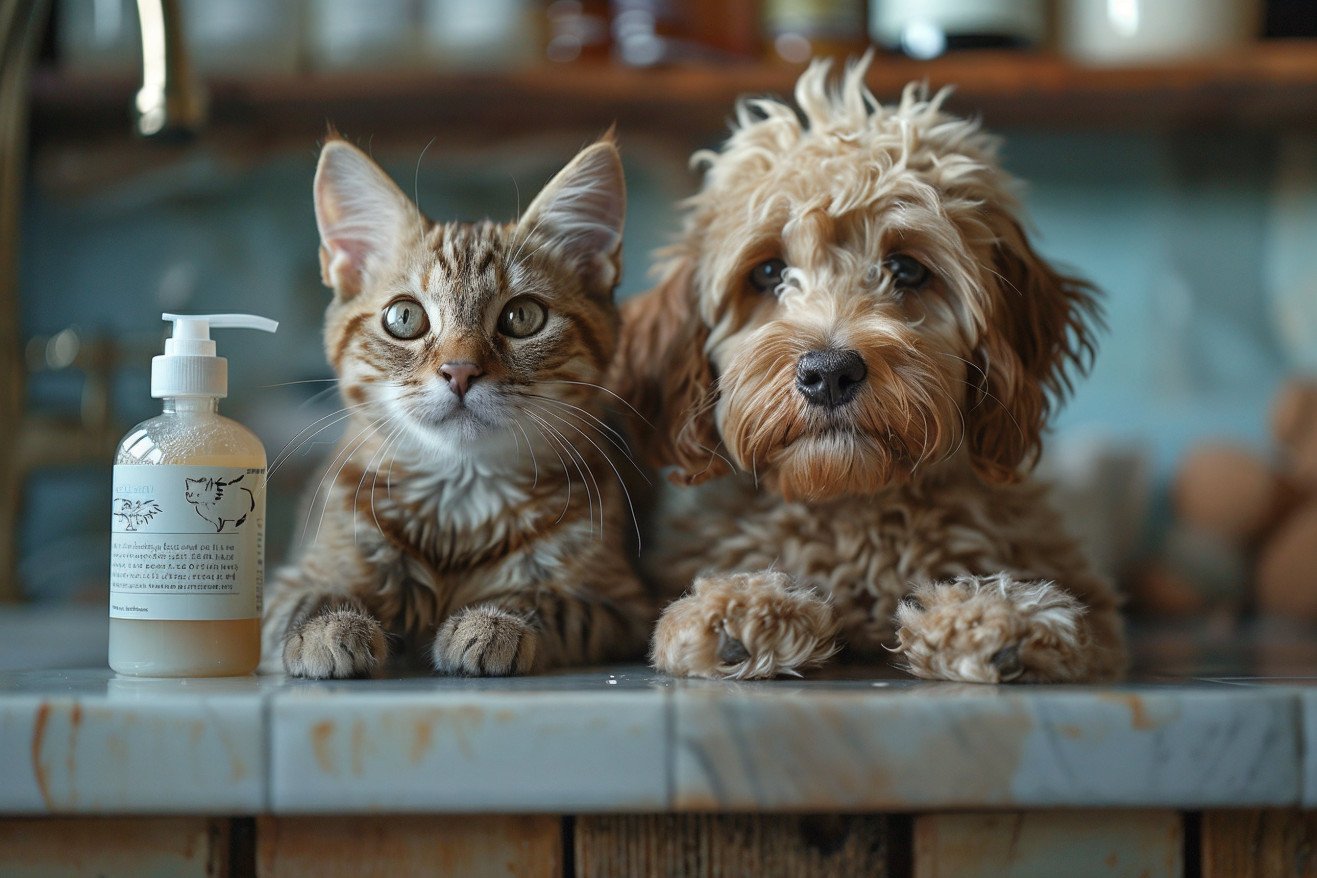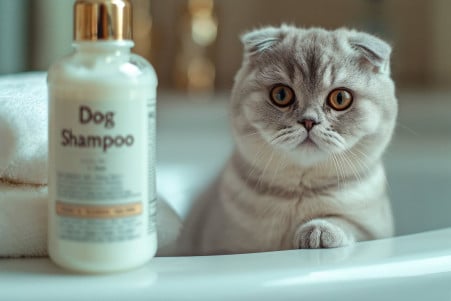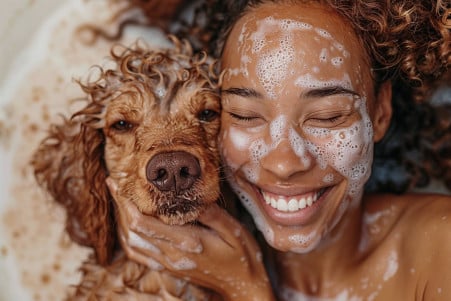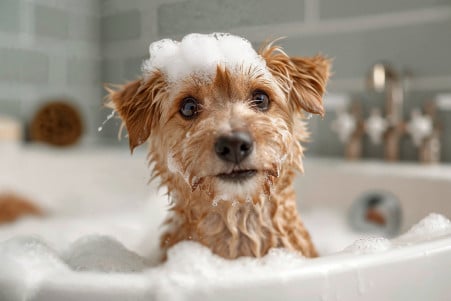Can You Use Cat Shampoo on Dogs? Understanding the Risks
16 May 2024 • Updated 16 May 2024

Although it may be tempting to use cat shampoo to bathe your dog, the differences between cat and dog skin and hair make it important to understand the potential risks and benefits. Cat shampoos are formulated with a lower pH to match cats' naturally more acidic skin, while dogs require a more neutral pH similar to humans. Using the wrong shampoo can dry out your dog's skin and coat, causing irritation, excessive shedding, or other issues.
To help you decide whether or not to use cat shampoo on your dog, we will discuss insights from veterinarians and groomers about why it's important to use products designed for the species. We will also look at studies of hair and skin biology to understand the differences that mean using dog shampoo is the best way to protect your dog's skin and coat and avoid potential problems. With this information, you will know how to best groom your dog to meet their specific needs.
Can you use cat shampoo on dogs?
Active Ingredients and Formulations: What's Actually in Cat Shampoo?
Cat shampoos are made with a cat's sensitive skin and coat in mind. They are made with natural, plant-based cleansers such as aloe vera and olive oil that will gently cleanse the skin and coat without stripping away the natural oils that protect them. These natural ingredients also help to calm and moisturize the coat, which is especially important because the harsher surfactants in some dog shampoos can lead to dryness and irritation.
One of the most important differences is the pH level. Cats have more acidic skin with an ideal pH of 6.4, while dogs have a more alkaline skin pH of 7.5. To avoid disrupting the skin's natural acidity and leading to dryness, itchiness, or infection, cat shampoos are pH-balanced to be slightly acidic.
To avoid irritation, the best cat shampoos are also free of synthetic fragrances, dyes, parabens, and other common irritants. Instead, they are made with hypoallergenic, gentle ingredients that are safe for sensitive skin. In contrast, many dog shampoos contain stronger surfactants, essential oils such as tea tree oil, and medicated ingredients such as permethrin that are toxic to cats.
While a cat may not be seriously harmed by the occasional use of a very gentle, unscented dog shampoo, the best way to ensure that you're not putting your pet at risk is to use a shampoo that's made specifically for cats. A cat's pH, skin sensitivity, and grooming needs are unique, and using a shampoo that's made with these factors in mind will help ensure that your pet's coat stays healthy and shiny.
How Safe and Effective Is It to Use Cat Shampoo on Dogs?
Although cat shampoos are safe to use on dogs occasionally, their milder formulas may not work as well as dog shampoos when it comes to deep cleaning dogs' thicker, oilier coats. Dogster says, "If you wash your dog with cat shampoo, it probably won't work quite as well and you'll likely need to use more product."
The upside of using cat shampoo on dogs is that it contains gentle, hypoallergenic ingredients that can help dogs with sensitive skin or allergies. Hepper explains that "cats have more sensitive skin compared to dogs, so cat shampoos are made with gentler ingredients that will not irritate their skin, such as oatmeal and coconut."
That said, the effectiveness of cat shampoo on dogs can depend on the dog. As the Douxo blog points out, "having been formulated for more sensitive skin and a different kind of coat, cat shampoo is generally not the best for getting the dirt and grime out of dogs' fur." The blog suggests that you consider your dog's breed, coat type, and activity level when choosing a shampoo.
If your dog has a specific skin issue or grooming need, you should talk to your vet or a professional groomer before using cat shampoo. They can help you figure out the best and safest options for your dog. In general, shampoos made for pets that are formulated for both cats and dogs may be a good middle-of-the-road choice for regular use.
How to Bathe a Dog and How Often to Do It
The frequency with which you should bathe your dog depends on a number of factors including the breed, the type of coat, and how active your dog is. As The Dog Retreat explains, "Depending on their medical conditions, your vet — or your pet groomer — might suggest using a medicated shampoo on your dog. But even healthy dogs can benefit from a grooming regimen that includes things like nail trimming and ear cleaning." For dogs with thicker coats, the blog notes that "their coats provide a natural insulation, so, groom carefully!"
When it comes time to bathe your dog, it's important to make sure you have everything you need and that you're setting up a safe and comfortable space. Martha Stewart recommends "the most important tips to remember - go slowly, use lukewarm water and only mild pet shampoos, and if using a blow dryer, always position it to the lowest heat setting to prevent skin burns and irritations." It's also important to make sure your dog's coat is completely wet before you apply the shampoo and that you rinse thoroughly to make sure you remove all of the shampoo.
You can also use a separate conditioner or moisturizer after you shampoo your dog to help prevent dry skin and to keep their coat healthy. The blog also explains the importance of making sure that you dry your dog completely after a bath to prevent skin irritation or infections. By keeping these things in mind, you can make sure that your dog's coat stays healthy no matter which shampoo you choose.
Potential Dangers and Side Effects of Using the Wrong Shampoo
Using the wrong shampoo on dogs can have serious repercussions for their skin and health. Dogs Naturally Magazine notes that many human and dog shampoos on the market today are made with harsh chemicals, artificial fragrances, and other potentially toxic ingredients that can throw off a dog's skin pH balance. This can cause skin irritation, dryness, and a loss of natural defenses.
The risks of using the wrong products go beyond human shampoos. MedVet explains that using flea control products or medicated shampoos made for cats on dogs can be very dangerous because the ingredients can be toxic or not work on dogs. Cats have more sensitive skin and can have severe reactions to these products.
Shampoo allergies are also a concern, with some dogs having allergic reactions to certain botanical extracts, essential oils, or preservatives in pet grooming products. WagWalking explains that symptoms can include everything from mild discomfort and itchiness to skin rashes and in rare cases, anaphylactic shock.
To avoid these dangers, it's important to make sure that you're using shampoos that are made specifically for dogs and to check with a vet before using a new product, especially if your dog has a skin condition or sensitivity. Part of being a responsible pet owner is making sure that you're paying attention to the products that you're using and making sure that you're prioritizing your dog's health and well-being.
Conclusion: How to Choose the Best Shampoo for Your Dog
While cat shampoo can be used on dogs in certain situations, it is generally recommended to use a shampoo specifically formulated for dogs to ensure optimal coat health and avoid potential issues. Factors like breed, coat type, and activity level should be considered when choosing a shampoo, and consulting a veterinarian or professional groomer is advised for personalized guidance.
Responsible pet ownership means prioritizing the health and well-being of our canine companions through proper grooming practices and staying informed on the latest developments in pet care products and techniques.


